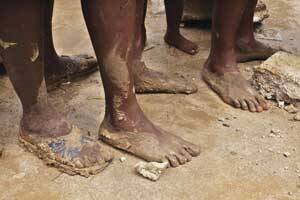With the rainy season on the doorstep in Haiti, Isaac Boyd, an emergency shelter expert for Catholic Relief Services, and a coalition of relief agencies from around the world are trying to confront an impossible task: getting the hundreds of thousands of people who remain homeless after the Jan. 12 earthquake into better housing, even if that means nothing more than a sturdy tent on safe ground.
The rainy season peaks in May, but sporadic drenching rains already are occurring, turning many of the temporary tent camps around Port-au-Prince, the Haitian capital, into muddy quagmires. Boyd and some of the world’s leading emergency shelter experts fear the flimsy shelters that people now call home will be inundated by the rainy season’s daily downpours, compounding an already taxing humanitarian crisis.
Accustomed to improvising, Haitians in the camps have salvaged whatever they could from collapsed homes and destroyed businesses: cushions, pillows, sheets, blankets, rope and sometimes a few pieces of wood. The more fortunate received an emergency shelter kit, bought plastic tarps or perhaps obtained a small nylon or canvas tent. None of those items were meant to be permanent, however.
The impending rains will create runoff that will push human waste into the walkways in the camps and perhaps even into the makeshift tents, creating the potential for a major outbreak of disease. Experts are scrambling to identify alternatives. The situation is complicated by the widespread devastation of the capital region that left few safe structures for people to occupy. C.R.S., which has raised nearly $121 million for Haitian earthquake relief, has provided 14,350 displaced families with emergency shelter.
Boyd’s primary concern is the 35,000 people living on the golf course at the Pétionville Club. The tent city rose within hours of the earthquake and quickly blossomed into a town of its own, with businesses and a quasi-government council. The U.S. Army continues to maintain security at the site, while C.R.S. oversees aid and food distribution.
But a recent overnight downpour left the tent city in “pretty bad” shape, Boyd said. “We’ve got to find a Plan B for Pétionville pretty darn quick.” Pétionville Club is just one site that worries shelter experts; more than 400 similar camps of various sizes have sprouted in devastated neighborhoods. Much of the relocation effort is focused on 21 sites with at least 5,000 people each. Seven of those sites—including the Pétion-ville Club—are in zones prone to flooding and mudslides, and relief workers are rushing to find alternatives for residents.
Some are in city parks and others are on parking lots and open land. None are adequate for long-term occupation. Except for a few hundred portable toilets that were delivered to some of the camps, there are no sanitation facilities. Very few have access to clean water. Boyd hopes to relocate people into safe structures in Port-au-Prince. Teams of engineers from around the world are assessing about 2,000 buildings a day to determine which are safe, which can be repaired and which must be demolished.








